
travelling & touring:with Burzil Dube
SOME elders used to advise us when we were growing up that whenever chicken was a form of relish in the family, there were certain parts that were considered sacrosanct and were “no-go area” even for any form of visitor.
As for the description of hallowed chicken parts, it would rather be pointless to mention them, but the tradition is still prevalent in some households even to this day.
This may seem awkward, but those were some of the so-called house rules of that particular period.
The above scenario is similar to a practice that was being followed by the early Tonga tribes, who settled in the then Wankie between 300AD and 400AD.
As earlier alluded to in previous articles, the Tonga tribe was considered to be of peaceful disposition, and renowned for being hunters par excellence.
They hunted elephants for their meat while tusks were traded as ivory with the early Portuguese settlers. Hippo meat was considered to be a rich delicacy for the Tonga.
During the time the word poaching was non-existent neither were there hunting quotas.
- Chamisa under fire over US$120K donation
- Mavhunga puts DeMbare into Chibuku quarterfinals
- Pension funds bet on Cabora Bassa oilfields
- Councils defy govt fire tender directive
Keep Reading
Whenever a hippopotamus was killed by a hunter, it is said that half of the carcass would be specifically reserved for the chief.
Yours truly was of the opinion that a hippo’s thick skin is only on demand when duty calls on disciplinary matters especially from correctional institutions among others.
Those were some of the issues related with Tonga way of life and it would be ideal if such practices are still prevalent in these modern times. So much about Tonga early hunting narration.
Around the 16th century the Tonga tribe under Chief Namabimba primarily settled in Kalomo in the area of Kabanga in Zambia and could have been migrating from central parts of the country.
However, due to old age, Chief Namabimba no longer possessed the strength to continue moving eastwards, hence they decided to settle at a place he had earlier named after himself; that is, Namabimba.
Chimutanta Musitezuba was crowned the next chief following the death of Namabimba and later decided to leave Kalomo and headed eastwards to present-day Zimbabwe.
They crossed the Zambezi River upstream of Victoria Falls at Chobe and later followed the river downstream with their first settlement being at Chenje in what is known today as Jambezi.
Chief Musitezuba is reported to have built his palace at some place called “Kalundu kanga muunzi” whose name and site is today still in existence.
This area is between Sikumbi and Gavu in the Jambezi area.
Due to the vastness of the area, Musitezuba appointed some headmen to oversee other areas and one headman was Sinenkumbwi whose zone of jurisdiction covered all tracts west of Chenje.
This headman was resident in what is currently known as Sikumbi and its proper name is supposed to be Sinenkumbwi.
In Jambezi another headman by the name Sinejambezi was appointed to look after this particular area while east of his chiefdom from Kanywambizi to Matetsi River, Makuni was appointed to superintend over that area as well.
Chief Musitezuba was also known for his supernatural prowess whose activity was known far and wide in terms of subduing invading enemy forces.
This Tonga chief is reported to have been in possession of a pot, which used to emit some strange thick mist meant to confuse any form of marauding adversaries.
The mist-emitting pot became handy at one time when the Kololo warriors under Sebitwane tried on numerous occasions to penetrate Musitezuba’s stronghold without success.
It is said that the attacking Kololo forces could have been blinded by the magic pot’s mist where they surprisingly found themselves scampering in different directions much to their chagrin.
The same also applied to the Matabele warriors whose tenacious fighting spirit was no match to the magic pot’s mystical powers, hence they retreated in frustration and bewilderment.
This resulted on Musitezuba being given all sorts of names due to his magical powers, which were unmatched during that particular period.
Some of the additional names he was given include Chimutanta Musitezuba Ng’onzi and that was considered to be among the most popular nicknames.
Musitezuba in Tonga lingo means shielding the sun while Ng’onzi is falling asleep, so in other words the names meant “the one who shields the sun and blinds the invading enemies”.
True to these nicknames, Chimutanta survived numerous raids and his tribe remained unscathed thanks to the mist-emitting pot whose source of power remained a mystery.
This has also been corroborated by George Ndlovu, a leading Tonga researcher who is also of the Chimutanta Ng’onzi chieftainship and is currently based in Lusulu, Binga.
However, it is said Musitezuba died mysteriously at his palace where he melted like ice and it was alleged that some form of magic could have been used against him.
Other reports stated that there were two strangers, who had come from a different local tribe and in the process had brought charms to bewitch the Tonga chief.
What boggles yours truly’s mind is that no one is willing to provide the name of that “different local tribe” that is alleged to have bewitched the chief.
Chayuma, the younger brother of Musitezuba, rose to the throne, but his reign was brief and was later succeeded by Singooma.
In the next article we look at how Muchela the temperamental chief was approached by Chilisa and his Nambya tribe for assistance to cross the Zambesi River to safety following Matabele raids at the Bumbusi citadel in Sinamatella.
Before signing off, yours truly would like to know the source of names such as Jafuta, Malindi, Kazungula, Kanywambizi and Chezya, among others. The same also applies to Makwa.
Till we meet again in the next column.
l Comments always welcome on: [email protected] or Twitter: @DubeBurzil











